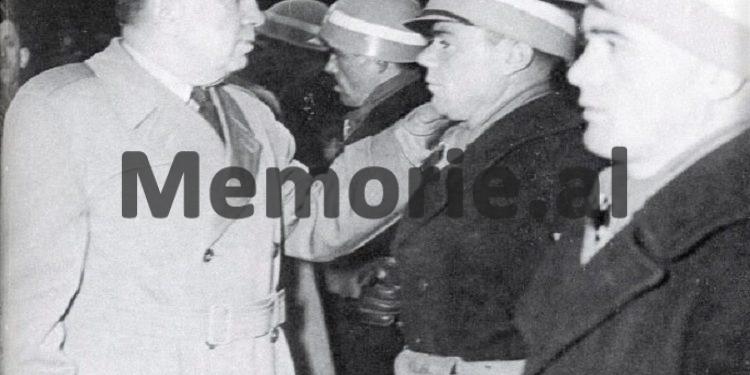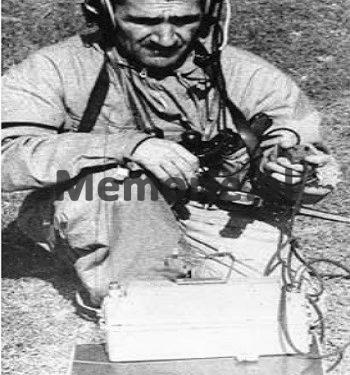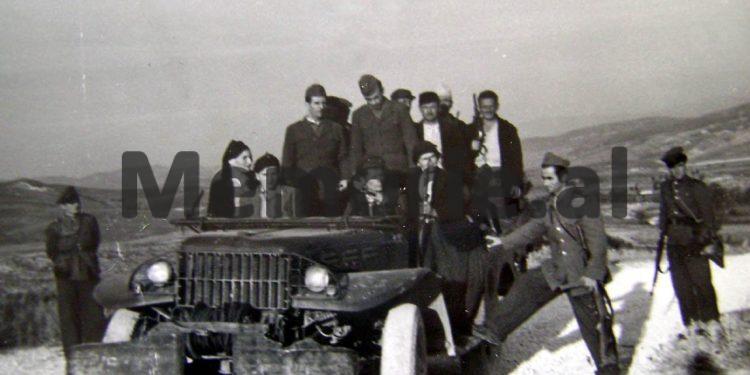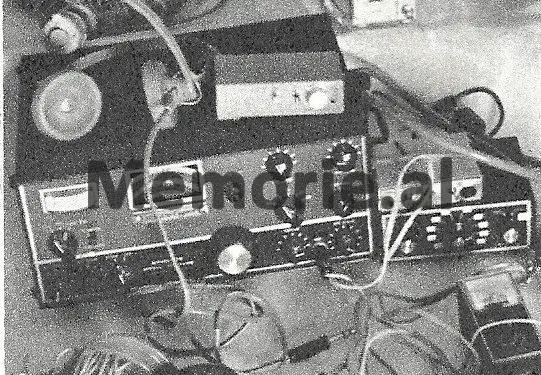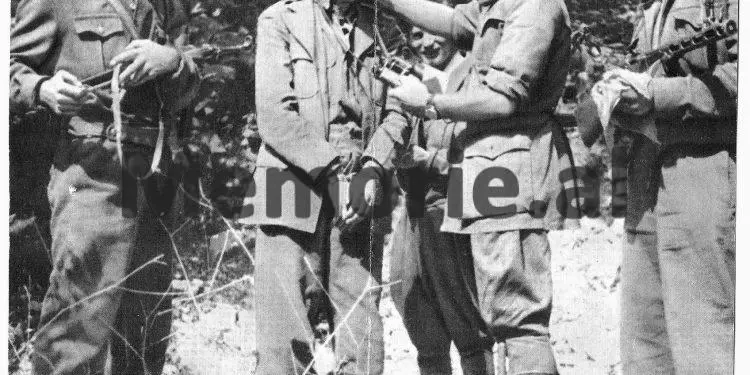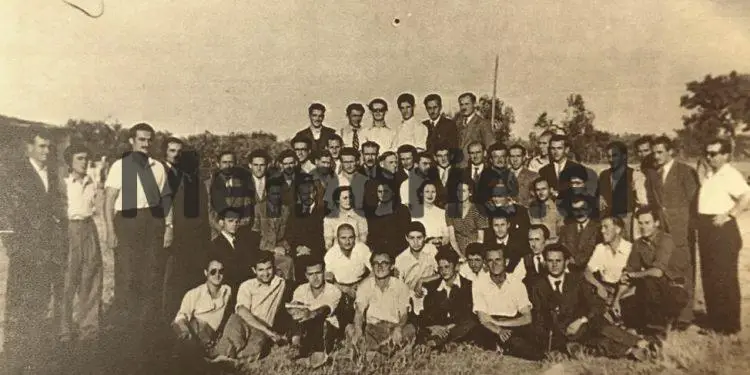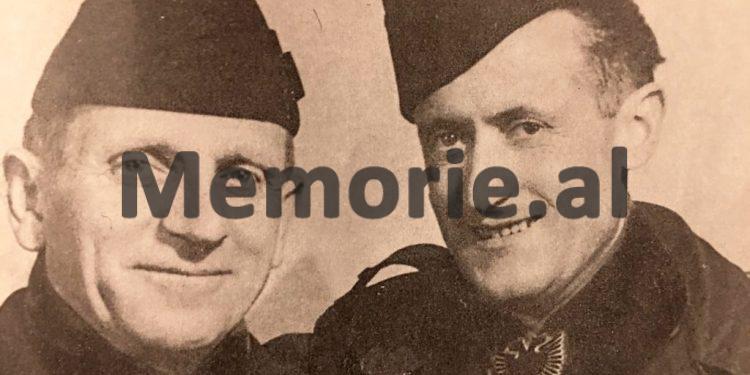By Dalip Greca
The third part
Memorie.al / One of the paratroopers sent on a secret mission to Albania by the CIA, for the overthrow of the communist regime of Enver Hoxha, is reported for the first time by the USA. About the CIA and ‘Mi-6’ operation against Albania, Zef Luka, one of the few paratroopers dropped by the Anglo-American intelligence agencies, testifies from Cleveland, Ohio, USA, to overthrow the communists and who lived for 13 months in the mountains of Northern Albania, escaping the detachments of the Pursuit Forces, who, assisted by the Russians and Kim Philby, captured and killed most of the paratroopers. Zef Luka, Shkodran anti-communist who survived and did not fall into the trap set by the Albanian State Security, in cooperation with Russian counter-intelligence; (trap fed by Kim Philbit, the English double agent, who operated in Washington; later moved to the Kremlin, declared “Hero of the Soviet Union”). Zef Luka, the former paratrooper lives in Cleveland, Ohio, does not forget for a moment the comrades with whom he was connected during the difficult days of the anti-communist war. He has a model diary, which reflects in detail the activity of those, whom he himself calls “One hundred Albanians who came with me to bring freedom”. Zefi’s messages, to write about those who lost their lives in this war, have been frequent, but in a special way, he asked to write about the “professor”, Alush Lleshanaku.
Zefi asks that the truth be written and not conjecture; requires some of the events to be clarified, since misinformation, even unintentionally, distorts history and this is not in the best interest of the nation, the more that those who can testify are rare, because the “scythe” of death has mowed one after the other. Zefi is the only one alive among the paratroopers who landed at that time, in the mountains of Northern Albania, to overthrow Enver Hoxha’s regime. I got in touch with Zefi again on the phone, to listen to his voice and to get testimonies about Alush Lleshanak, whom he, like many of those who knew the professor, adored.
Continues from last issue
The history of Alush Lleshanak’s group
In Korça, in July 1950, the group accused of Greek and Yugoslav espionage, led by Shefki Hysa, was discovered and convicted, which included Demir Biçaku, Seit Jazexhiu, etc. They cooperated with the Greek “saboteurs”, Hasan Matraku, Hiqmet Çiflik and other UDB saboteurs, such as Ahmet Alarupi, etc. Alush Leshanaku, an instructor at the Italian intelligence school in Rome, seeing that all the sabotage and espionage groups he had prepared and sent to Albania had failed, set off on his own at the head of a landing group in February 1950 but after reaching Albania, he found himself isolated and forced to take refuge in the mountains. Feeling himself close, Alush Leshanaku sent this radiogram to the Italian secret service on February 20, 1950:
“No. 113 Gj. 313-31055- This is the third time I tell you, that I don’t have the slightest opportunity to communicate during daylight hours. As I explained to you before, with my phone No. 97, in this locality, it is not permissible to raise the antennas during the day, because it can be seen by everyone. Not only in the vicinity around here, but almost in the entire area of Elbasan, there are no large forests and uncontrollable by people, shepherds, dogs and hunters, which makes it impossible, without being discovered and recognized by the enemy. I have previously set the time, for the night. I have called every evening at 6 o’clock and every morning at 4 o’clock. You have not answered. I do not understand why on the 17th of the following day, at 20:00, we connected and I told you about the next day, at 3:00, but you did not come, you did not answer my call.
I have also continued to call you at night, at pre-arranged hours, and you have not answered. I do not understand your behavior and reasoning. If you want to flog my skin at your whim, it is not fair and proper. If you want me to go to the high mountains, where there is at least five meters of snow and not only is it impossible, but it is not even worth the burden of rent, because there, we will be isolated for 5 months and I will not I can communicate to you, except the meteorological bulletin and the movements of the wolves. So, in short, I’m stopping the daily communication and will broadcast, only at 20.00, every evening. Quatter An i volen. If you listen to me and don’t call me at that hour, I will be tight, cut off communication with me forever, – Alushi. Like the others, this old and experienced landing party, as well as valuable personnel trained by the Italian reconnaissance, was destroyed with its entire group on December 30, 1950.
Mr. Luka, how did the story of Alushi and his squad go?
“It was December 1950. I had gone to receive the service, I was the first guard. At night, I had a terrible dream; a large pit, around it nine corpses with open mouths. Oh, God, what a horror that dream is! At 9 o’clock, according to the daily rule, we called Rome. They told us that they had given us an important radiogram. We were waiting for him with anxiety and deep concern. The radiograph came. It said that; “Radio Tirana has given the news that Alush Lleshanaku was killed, give us the details”. We were surprised and fainted. My soul hurt. I had my idol, my teacher to guide me in this fierce struggle. I had trusted him. We immediately went to the village, met the priest, took the “Zanin e Populli” and immediately confirmed to Rome, the news about what the newspaper wrote: He was killed at 4 o’clock at night, as he crossed the bridge, at the Broshke staircase. The youth, some of whom were also communists, when they saw him, said: ‘Alush, what did you need to come’? Many of them were also students of Alushi”.
How did you handle Alushi’s death, how did it affect your fight against communism, and what decision did you make afterwards?
“I said it and at the beginning of the conversation, Alushi was special. He loved Albania more than his own mother. I don’t know how much what I’m telling you expresses, his determination to sacrifice himself for the Motherland. The northern group was greatly affected by his loss, that of Elbasan, even more. But since Alushi passed several times in the north, worked as a professor in Shkodër, landed in the north for radio supply, our only consolation was that he was not found by evil in the north; otherwise, we would be left with lead, in our souls. With the death of Alushi, other groups were banned and moved to Albania, such as: Xhevdet Blloshmit, Shyqyri Bicaku…”!
Did you learn any real news about how the communists dealt with Alushi’s dead body?
The communist state put it on a pole in the Bolbolla maple tree, so that people could see it. They also informed his wife, but she refused to go.
Do you think Alushi was killed, or is there another version?
“I had written the story in detail in my diary, but I was forced to remove it at the last moment. Alushi’s children were not of the opinion that the names of those who are thought to have taken Alushi’s life, delivered him, or poisoned him before…!
You, as if you are saying many variants at once, what is the truth?
“Alush was a rare person, he was brave, but smart, he had only himself as a friend, he did not easily fall into a trap, but the State Security managed to penetrate the ranks of the nationalist fighters, he poisoned a part of those who reached to catch, he made them his own, some surrendered to the brutal torture and agreed to cooperate and play the game of Security. This is what happened to those who betrayed Alushi, the good Albanian, who did not know loyalty…”!
This is where the interview with Zef Luka ends, who after the murder of Alushi, felt alone and the pain almost ripped through his chest. The time had come for him to leave the mountains and call his duty to his ideal completed. In his diary, he would write: “August 1951…! We prepare to leave the mission. I kept my word to Alush Lleshanak; as long as he was alive, I was committed, don’t let Albania go. The situation worsened day by day. The people told us that they were spying on us from outside. Those of the National Committee “Free Albania” captured them alive when they set foot in Albania, as happened with Hamit Matjani, friend of Alushi, among the best boys of Albania”.
Zef Luka took the way back and together with Pashko Leta, Pjetër Gjon, with his wife, Katerina, Vat Staka, Fran Sokol, Preng Keqani with Gjin, Fran Kola; the latter were killed by State Security on the way, in the field. The odyssey of suffering continued even after crossing the border. The UDB was not allocated to him, but Zefi had told him; “no”, cooperation with Albania’s enemies. He went through all the provocations and even the arrest with a cool head. Even the difficult days of prison, from December 1951 to March 1952. With courage, Zefi despises those who collaborated with the UDB.
* * *
But let’s return again to the history of Alush Lleshanaku, using other sources, to follow the path of his anti-communist activity, mainly in Central Albania, where his efforts to unite the anti-communist resistance until the fatal moment, when his life was cut short, perhaps because, for the first time, he believed too much and fell into the trap of infidelity. Through documentation and testimonies, Lulëzim Petrela has managed to follow the traces of the anti-communist war in Central Albania, the area where Alushi operated. In his publication; “The armed anti-dictatorial stand in the mountains of central Albania in the years 1944-1950”, (signed under the name Fiorito Petrela), brings details about the organization of armed groups, where Alush Lleshanak’s organizational skills stood out, to coordinated the forces that had occupied the mountains with weapons in hand, to overthrow the communist regime. Alush Lleshanaku was among those anti-communist fighters, who imposed faith in his cause, not only among his collaborators, but also among other nationalists who operated in other parts of Albania. One of the examples that illustrate this idea is the living testimony of Zef Luka, who, after Alushi lost his life, decided to leave the mountain life because he no longer saw a window to continue the mission.
Zefi, on behalf of the northern nationalists, affirms: “We were comforted by the fact that Alushi was not killed in the north of Albania, otherwise our conscience would kill us for the rest of our lives, that he was killed in “our home”. Alushi really had Central Albania as the area of his actions, but he often happened to be in the north, among the paratroopers who had landed there, with whom he had passed together in the camps of Greece and Italy.
In his area of combat operations, Alushi enjoyed tremendous confidence. He was the initiator of a general gathering of fugitives in the mountains of Central Albania.
This extremely important meeting for the further destinies of the anti-communist war was held on July 28, 1946 in the place called Kroi i Zogut in the village of Allajbeg in Belshi, Dumre province, Elbasan district. In fact, according to Fiorito Petrela, this meeting, the size of an assembly, was called after the ambush that was made of Sul Selima’s squad, otherwise known as the “iron squad”, which was bled to death in an ambush that had been organized Insurance.
The meeting was called by Alush Lleshanaku, who was, in a way, the brain of the coordination of anti-communist actions in Central Albania (Tirana-Durrës-Elbasan-Lushnje-Peqin-Shijak-Kavajë). Meanwhile, as the soldiers of Sul Selime’s detachment were treating the wounds received in the ambush, Sula received a notice from Alushi to meet him in Papër-Sollak (Dumre), at Hysa Haxhiu’s house. The meeting was organized there. Alushi was together with Ali and Ibrahim Çela. The object of this meeting was precisely the organization of the July 28 assembly to be held in Allajbeg. It was agreed that the meeting with all the fugitives in Central Albania would take place exactly at Kroi i Zogut, due to the fact that there was also a dense forest nearby, and no matter what, there would be a possibility of escape in case of danger. . As for the topic of the assembly, it was agreed to discuss the coordination of actions in the future, actions aimed at overthrowing Enver Hoxha’s regime. The Assembly of Allajbeg, on the other hand, intended to be preceded by another meeting with larger dimensions than this one. It was about a more extended assembly, which had been announced to be held in September 1946, where it would be discussed about the possibilities of organizing an armed uprising, which would be simultaneous with the forces operating in the North of Albania and would lead to the overthrow of the communist dictatorship that was being installed in Albania.
So it was about a general uprising. The meeting between Alushi and Sulë Selime took place without any incident. The Pursuit forces failed to get wind of the merger of the two squads, otherwise they would have attacked, to get rid of two of their most sworn enemies, who had been looking for them like candles for a long time. On July 28, 1946, the announced meeting of Allajbeg was organized, where it is thought that more than 200 fugitives from that area participated, who had long ago left their family homes and took up arms to overthrow communism. Hamit Matjani, one of the most dangerous anti-communist fighters, was also present at this assembly. Hamit was accompanied by Hima, his brother, Ibrahim, (who would later be killed and give his life in the war against communism), where he was killed with his three nephews: Hasan, Dalip and Hajdar. The sacrifice of the Matjani family, in the name of anti-communism, would not end there; Hamit’s other brother, Asllani, and his uncle’s son, Veliu, would also fall in the attempt. Among the well-known names of the anti-communist war, participants in Allajbeg’s meeting would be Nuri Plaka and Ramadan Kelmendi.
Hamiti was from the village of Matjan i Lushnja, Nuri Plaka from Gostima e Cërrikut, Elbasan, while Ramadan Kelmendi was from Kosovo. In Fiorito’s notes, it is written that these three: Hamit Matjani, Nuri Plaka and Ramadan Kelmendi, would fall into the trap of the State Security, betrayed by Xh. Mema, D. Kurti and B. Hoxha, without forgetting the contribution of Zenel Shehu, had long since accepted to play the State Security game.
Among the participants of the Allajbeg assembly, it is worth mentioning other anti-communist fighters such as: Latif Karafila, Adem Tafani, Veiz Gjolena, Fetah Shabani; the three brothers; Sefer, Shaban and Pasho Gjika, from Shalesi i Elbasani; Emin Lamçe; Cen Graceni, Mersin Muzhaqi; he was the one who was called the hero and the brave of the Zgoshti Cave of Librazhdi, Isak Alla with his brother, Kamber. Isaku had entered the song, about the war and the heroic resistance, which he had done at the Zgoshti Cave, in the years 1945-’46. Azis Biçaku and Xhevdet Blloshmi had not been able to come to the assembly, as there had been obstacles in their journey. It was a regular meeting, where not only the leaders discussed. In the minutes of that meeting, the words of the organizer and leader of that assembly, Alush Lleshanaku, who opened the meeting, have been preserved. He told the attendees about the efforts being made by the mountain fighters to overthrow communism.
He told about the meetings he had in the north of the country with the chairman of the “Mountains Committee”, Llesh Gjonmarkaj, as well as with Jup Kazazi from Shkodra, who, after a month, would be at the head of the Postriba uprising. Alushi threw the oath that a quick organization had to be done, that there was no time to lose; it was about a simultaneous and general uprising in all of Albania. Alushi said that; the next meeting would be organized in September, which would be held on September 1 in Belgium. Alush Lleshanak’s speech was liked and approved. After him, Sul Selimja spoke, who had become the terror of the Pursuit Forces. He added his opinion to Alushi’s words: “With actions, assassinations and sabotage, we would not have any interest, because the country would be destroyed and the people would be taken care of”. Pasho Gjika was harsh in his words, his words fell like a bomb in the assembly: “Let’s all take up arms, to overthrow these anti-nationalists, who are all with the spirit of the Serbs”. But not even two days passed from the meeting and Pasho Gjika was killed by the Pursuit Forces, in his home.
The double life he led as a man and as a fighter, as a group leader and as an enemy declared by the communists, had taught Alushi to be cautious. Under these circumstances, he was endowed with extraordinary intuition. Alushi, it seems, made a mistake only once, but unfortunately the mistake was fatal, irreparable, it cost him his life. After Allajbeg’s assembly was over, Alushi and Sul Selimja went to Hysa Haxhiu’s house. With his intuition, half in jest, half in truth, Alushi tells those present: “We must speed up the overthrow of the dictatorship, because the time will come when this shelter we have here (Hyse Haxhiu) will be connected to the Security, and they will catch us all one by one…”! And according to Fiorito Petrela, who has met Alushi’s comrades-in-arms, who remained alive, Hysa reacted to Alushi’s words, making a negative sign with her right hand: “I will never betray you”, – she meant with that sign, unaccompanied by voice Hysi. But the truth is as Alush Lleshanaku predicted. He later connected with State Security and raised “legs” for Alushi’s friends.
On the other hand, the State Security, in the meeting of the fugitives of Central Albania, had introduced its own eavesdropper, collaborator, volunteer of the State Security, Xh. Sh, from Kuqani of Elbasan, who did his job and throughout the area, a harsh and unprecedented terror broke out. The second meeting, the one in September, which was supposed to aim at coordination with the North, did not take place, not only because of the terror that broke out, but also because of the infiltration of the Security collaborators, who had increased a lot at that time and de-conspired all the actions that would be undertaken. Another reason was that the Postriba uprising started prematurely, in August 1946, while it was supposed to start in September, after the meeting of the fugitives of Central Albania, which was announced to start on September 1. Being isolated, Postriba was crushed with blood by the communist state, which of course found it easier to act in the conditions of non-coordination of anti-communist forces.
After the failures that came as a result of Postriba’s suppression, Alushi tried to coordinate his forces once again. For this purpose, he went to Zgosht in Librazhd, to meet with Isak Alla and Azis Biçak, then he went to Okshtun in Dibra, to meet with Fiqiri Dina, but there he learned that Fiqiri, together with Prenk Previzi and Hysni Demë, had come out in Greece. He had no choice but to go to Greece during ’47 (he met Zef Luka and others there in the camps). Alushi would return to Albania again, to continue his mission, on February 15, 1949 and December 1949. But what happened to Alushi, at the base where he had gone to spend the night? As we showed in the previous issue, it was conveyed by Gjon Gjinaj and Zef Luka. After crossing all the dangerous paths, Alushi and his friends, under the nose of the Pursuit Forces, arrived in Elbasan. It was December 1950. Along with Alushi, there was one of his sworn loyalists, Rexhep Kasa. Both of them went to the base, where the tragic event would take place.
There are two variants forwarded so far; one variant is that of poisoning through food. Alushi was muscular and they were afraid to meet him body to body, so before that, it is thought that they put him to sleep. The other variant shows that Alushi suspected that something was going on in that house, where, in addition to one of Alushi’s friends, there were also two others who had presented themselves as friends of the lady of the house. It is possible that Alushi, after having doubts, tried to leave, but it was too late; they shot and killed him. These variants have been discussed in the Tirana press since 1992. But let us bring as evidence the most reliable variant, what R. Krasniqi confesses, who, unlike what has been written so far, confesses that Rexhep Kasa, Alushi’s loyal friend, member of his squad, was not killed that night, as the newspaper “Voice of the People” and “Bashkimi” wrote, but he remained alive and testified to the double truth in two versions.
For his part, Kasa, according to Krasniqi, is isolated in the dungeon of the Greek camp, in Narac, Zadrima. Regarding this, Rexhep Kasa said: “After we separated from Gjon Gjinaj, Alushi chose only me to accompany him. We entered Elbasan, as Alushi wanted to reorganize the work in that area. We went to a friend of Alushi’s. I remember that in that house, we went to bed to eat dinner. However, after eating, Rexhepin fell into a deep sleep, so that he did not know what happened there. He reminded Krasniqi, the fact that, when he woke up, he saw himself tied up in the cell, as well as when he was tied up, he did not remember anything. I don’t know, – he added, – what happened to the brave Alush Lleshanaku! Maybe he also suffered the fate of Rexhepi, maybe they put him to sleep, maybe he was killed in an attempt with them, maybe…?! All remain guesses. When he was called, Rexhep Kasa, he remembered that in that Elbasan house, where he was sheltered, he and Alushi had seen three men and a woman, this was the lady of the house, while one of the three men was Alushi’s friend; the others, who were unknown to Alushi and Rexhepi, may have been from State Security.
“All the people of that house were unknown to me”, said Kasa, who also remembered another detail. While he was eating with hunger, Alushi continued to talk to unknown people. In fact, Alushi had pointed out before the food arrived, something that caught his attention; he was impressed by the very long delay of the dinner and had openly expressed his concern and doubt. Perhaps Alushi later combined his suspicion, about the long delay of dinner, with the deep sleep that engulfed Rexhep, as soon as he had eaten a few morsels and tried to lie on them, or tried to escape from them. , and just then, maybe they killed him…! Thus, even after these facts and testimonies, the death of Alush Lleshanak remained an enigma, which the State Security wrapped with a mysterious veil. In support of this opinion, comes the later testimony of Rexhep Kasa, who remembered that they had taken Castile to prison, so that he could see the newspaper “Zëri i popultil”, which wrote about the death of Alushi. It read: “Alush Lleshanaku was killed in an attempt, somewhere near Elbasan, together with his friend, Rexhep Kasa(?!). He couldn’t believe his eyes when he saw his name among the victims of that bloody night, where betrayal and trap had taken the life of one of the intellectual nationalists, one of the brave men who stood out from the rest. But what happened to Rexhep Kasa? He himself has testified: “They have been keeping me in isolation for several years, here in the dungeon of the Greeks in Zadrima, asking me about every action, both inside and outside the country. About Alushi, they have been asking me for almost a year. Kadri Hazbiu himself has come to ask me…”!
Zef Luka still feels the pain for his old friend Alush Lleshanaku and for a moment he does not remove from his mind the thought that; Alushi loved Albania very much. He did not avoid the danger even though he had the opportunities to build his life differently and seek his own and his family’s happiness in the West. For him, Albania was above everything, so he did not abandon it. Now in his old age, Zef Luka, who lives in Cleveland, thinks of his comrades-in-arms, friends of the ideal. He is among the only ones left alive and asks that the history of their war not be distorted. Everyone should be given a chance. I often find photos in envelopes and write dates and dedications behind the photos. “Look, don’t forget Hamid Toshin, he was a good, brave man. We got along well with each other, northerners and southerners, Muslims and Catholics. We loved Albania very much. The communists called us saboteurs, but I think we were Albanians who flew to bring freedom. I will never forget the words of a mountaineer, who told his family members: These have left the life of Rome, with all the good things, and have come to save us…”! Zefi lives with the memories of those difficult years. Memorie.al




